

Physical, cognitive and mental health impacts of COVID-19 following hospitalisation: a multi-centre prospective cohort study. Seven in 10 UK Covid patients still affected months after leaving hospital. Seven in 10 patients hospitalised with Covid-19 have still not fully recovered after five months, and they appear to cluster into four distinct categories based on their symptoms, research suggests.
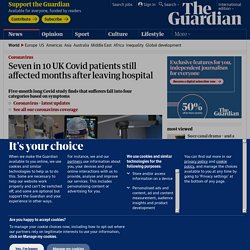
The study, one of the world’s largest into long Covid in hospital patients, includes a group with persistent brain fog, which bears little relation to the severity of their other symptoms. More than 300,000 Britons are estimated to have received hospital care for Covid-19 during the pandemic, and the UK-wide Phosp-Covid study has been following the health of 1,077 of those discharged between March and November 2020 – ranging from intensive care patients to some who only visited hospital for a few hours.
Five months later, the patients had nine persistent symptoms on average, with one in five meeting the threshold for a new disability. When Covid Spread to Gorillas. But there is a big distinction between such respiratory infections and SARS-CoV-2, Dr.
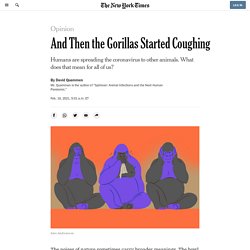
Leendertz said, and that’s the “broad species range of this virus”: its capacity to infect and be transmitted among not just primates but also cats and mice and deer or mustelids like mink and ferrets, and not just in zoos, laboratories and farms but possibly also in the wild. That could result in what disease ecologists call a sylvatic cycle (from the Latin word “sylva,” meaning forest), with the virus circulating endlessly in wild animal populations, if they are large and dense, and spilling back into humans when circumstance allows.
North American deer mice, for instance, also seem susceptible to SARS-CoV-2, suffering infection and transmitting the virus to other mice, according to one preprint study, which has not yet been peer-reviewed. Has the pandemic really caused a 'tsunami' of mental health problems? How is the population of the UK coping with the continuing coronavirus crisis?
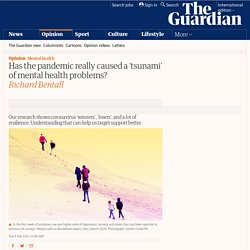
According to some media reports and commentators in the mental health community, we are now facing “the greatest threat to mental health since the second world war” and a potential “tsunami” of psychological problems. With a team of experts from the Universities of Sheffield, Ulster, Liverpool, UCL and Royal Holloway and Bedford College I have been monitoring the mental health of the UK population since the beginning of the crisis. Looking at our findings, we think that this tsunami narrative is misleading. If accepted uncritically, it could undermine efforts to protect the health of the population and also our ability as a nation to recover once the crisis is over. Here is why. Like many other mental health researchers, we quickly recognised the importance of understanding how the pandemic affected the wellbeing of ordinary people. Scotland Coronavirus Tracker. When someone tests positive in Scotland, the case is assigned to an NHS health board region.
Normally by their postcode, but if there’s no postcode available, then they are assigned to the health board in which they took the test. So even if there’s no postcode available for the person who tested positive, the case will still be counted. And as a result, the daily health board increases we get told about will exactly match the nationwide increase. The case will also be assigned to the relevant council area, again going off their postcode. However, if there’s no postcode available, then this infection won’t be assigned to any council region. To make things more confusing, I think postcodes can be assigned at a later date, which results in the council area having an ‘increase’, which actually happened weeks ago. So if you see the council area infections not matching the nationwide totals, then this will be why! Talking can spread Covid as much as coughing, says research. Speaking to a friend when infected with the coronavirus could be as dangerous as coughing near them thanks to lingering particles, research has suggested.
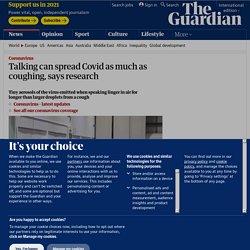
Covid can be spread through a number of routes, including virus-containing droplets emitted when an infected person breaths, speaks or coughs – a factor experts said could help to explain why Covid seems to spread more easily in indoor settings. While large droplets fall to the ground over short distances, tiny droplets known as aerosols can carry the virus over distances greater than two metres, and linger. Now experts have developed models to explore the risk posed by large droplets and aerosols, and explore ways to mitigate it. Their results suggest it takes just a couple of seconds for expelled particles to travel beyond two metres. The team concluded it was unsafe to stand without a mask two metres away from an infected person who is talking or coughing, with both situations posing an infection risk. Joggers and cyclists should wear masks – here's why. England is deep into its third lockdown, yet the daily tally of new COVID cases and deaths remains sickeningly high.
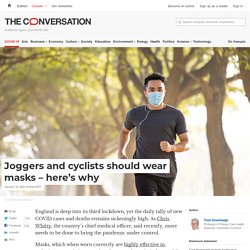
As Chris Whitty, the country’s chief medical officer, said recently, more needs to be done to bring the pandemic under control. Masks, which when worn correctly are highly effective in reducing transmission, are already compulsory in indoor public places in the UK. There is talk of making them mandatory in some outdoor settings, as is currently the case in Spain. Perhaps the UK should follow France and require people who are jogging or cycling to wear masks if they are unable to maintain a physical distance from pedestrians. Inside the B.1.1.7 Coronavirus Variant. How the Oxford-AstraZeneca Covid-19 Vaccine Works. 2020 12 31 COVID19 Report 42 Preprint VOC.
New Covid variant linked to higher viral load in the blood. The hypothesis that the fast-spreading UK variant of the Covid-19 virus has a transmission advantage has been bolstered by an analysis that suggests it is linked to higher loads of the virus in the blood.
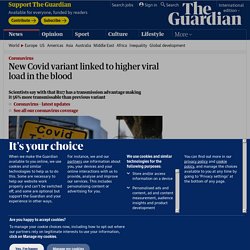
The variant, named B117, was discovered during an investigation into why coronavirus cases in Kent continued to rise during the November lockdown. Scientists found it continued to spread during the restrictions while older variants declined. 2020.12.24.20248834v1. Estimated transmissibility and severity of novel SARS-CoV-2 Variant of Concern 202012/01 in England Status: report | First online: 23-12-2020 | Last update: 23-12-2020 Authors: Nicholas Davies*, Rosanna C Barnard1, Christopher I Jarvis1, Adam J Kucharski1, James D Munday1, Carl A.B.
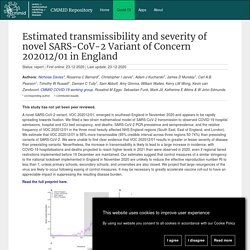
Pearson1, Timothy W Russell1, Damien C Tully1, Sam Abbott, Amy Gimma, William Waites, Kerry LM Wong, Kevin van Zandvoort, CMMID COVID-19 working group, Rosalind M Eggo, Sebastian Funk, Mark Jit, Katherine E Atkins & W John Edmunds.* corresponding author1 contributed equally. Coronavirus and the impact on students in higher education in England: September to December 2020. Personal well-being and reported mental health conditions - pre-pandemic Over recent years, personal well-being of undergraduate students has declined (Student Academic Experience Survey, 2020 (PDF, 700KB)).
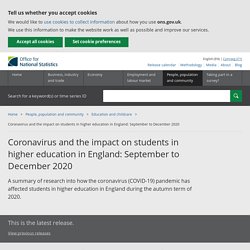
On all four domains (life satisfaction, life worthwhile, happiness, low anxiety), undergraduate students report substantially lower levels of well-being compared with the general population aged 16 to 24 years (see Figure 1). Figure 1: Personal well-being measures scoring "very high" have decreased over time for students and are lower than the general population aged 20 to 24 years. Tracking the Coronavirus at U.S. Colleges and Universities. Tracking the Coronavirus at U.S. Colleges and Universities. Understanding 'aerosol transmission' could be key to controlling coronavirus. Imagine you think there are mice in your house.
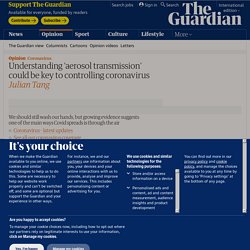
You can see the evidence – mouse droppings; gnawed or damaged skirting boards; holes left in food packaging. You call a local pest control team who confirm that you have mice and advise you on what is needed to remove them. Neither of you have actually had to see a mouse to reach this conclusion. Because of this, scientists can reasonably infer that the virus contaminates its surrounding environment.
People nearby may inhale it, and as the virus floats through the air, spreading further in poorly ventilated environments, those who are further away could also become infected. The evidence that Covid can spread via aerosol transmission takes one of two different forms. Universities. Virus that causes Covid-19 can survive up to 28 days on surfaces, scientists find. Australian scientists have found that the virus that causes Covid-19 can survive for up to 28 days on surfaces such as the glass on mobile phones, stainless steel, vinyl and paper banknotes.
The national science agency, the CSIRO, said the research undertaken at the Australian Centre for Disease Preparedness (ACDP) in Geelong also found that Sars-CoV-2 survived longer at lower temperatures. It said in a statement the virus survived longer on paper banknotes than on plastic banknotes and lasted longer on smooth surfaces rather than porous surfaces such as cotton. However, the experiment was done in a dark area which negates the effects of UV light. Peter Collignon, a professor of infectious diseases at the Australian National University, said this is known to reduce the life of the virus on surfaces. “It is a factor, and that’s why the outside is probably again safer than inside because UV light is there and the virus can be inactivated on playgrounds and things in the sunshine,” he said. UV cabinet that zaps Covid 'could become fixture of UK homes' A “disinfection” cabinet that zaps coronavirus could be this Christmas’s must-have gadget as manufacturers tap into demand for professional levels of hygiene in the home.
The UV cleaning cabinet, which resembles a microwave and costs £199, is one of a range of anti-coronavirus appliances being put on the market by the electrical brand Beko. The appliance-maker thinks the metal box, which uses UV light, could become a fixture in British hallways. The device can be used to kill bacteria and viruses on the surfaces of personal effects such as keys, mobile phones, bags and toys. The Hygiene Shield range, which also includes a fridge with a disinfection drawer and tumble dryer with a UV setting, was rushed into production after a poll of Beko customers in 31 countries found widespread concerns about domestic hygiene.
The range is designed, it said, to provide consumers with “peace of mind that their homes are safe and clean”. Charting a Covid-19 Immune Response. Amid a flurry of press conferences delivering upbeat news, President Trump’s doctors have administered an array of experimental therapies that are typically reserved for the most severe cases of Covid-19.
Outside observers were left to puzzle through conflicting messages to determine the seriousness of his condition and how it might inform his treatment plan. Though Mr. Trump left Walter Reed medical center on Monday night to continue his recovery in the White House, the future of his health status is unclear. Physicians have warned that the president remains at a precarious point in his disease course. How Coronavirus Spreads. Did early focus on hand washing and not masks aid spread of Covid-19? From the moment coronavirus reached UK shores, public health advice stressed the importance of washing hands and deep-cleaning surfaces to reduce the risk of becoming infected. The advice was informed by mountains of research into the transmission of other respiratory viruses: it was the best scientists could do with such a new pathogen.
But as the pandemic spread and data rolled in, some scientists began to question whether the focus on hand hygiene was as crucial as it seemed. Contaminated surfaces, such as doorknobs and light switches – “fomites”, to use the scientific terminology – may not be such a big deal, they claimed. The issue has resurfaced after Monica Gandhi, a professor of medicine at the University of California, San Francisco, told the US science magazine Nautilus that the easiest way to catch the virus was through droplets and aerosols sprayed from an infected person’s mouth or nose.
Oxford COVID-19 study: face masks and coverings work – act now. Youtube. Covid 19 Transmission Taking Stock of the Science. Prospective Observational Study of Screening Asymptomatic Healthcare Workers for SARS-CoV-2 at a Canadian Tertiary Care Center. Risk management matrix sept 2020 final. The Infectious Nature of Patient-Generated SARS-CoV-2 Aerosol. Face Mask Blowtorch Experiment - Video. To prove his face mask worked, YouTuber "Uncle Rob" performed an experiment with a homemade "Coronavirus gun" and a blowtorch. In the video, Uncle Rob sprayed flammable liquid through a mannequin head—both with a mask on and off—to see if it would light a propane can on the other side of his yard.The lesson: Masks do work. But please don't try this experiment out at home. While public health organizations like the U.S. Centers for Disease Control and Prevention and World Health Organization have recommended face masks to stop the spread of COVID-19, a vocal minority of the U.S. population still remains skeptical of the science behind the cloth coverings.
So YouTuber "Uncle Rob" is here to settle the debate once and for all—with two mannequin heads, a few masks, flammable liquid, a little bit of propane, and his imagination. . 🔥 You like fire. Okay, so maybe Uncle Rob's method doesn't exactly follow the scientific method or stand up to rigorous peer review. It kind of checks out. WHWB AEROSOLS AND SCHOOLS. Ciaa1283. 3053 methodes barrieres environnements travail covid19. Scientists work on nasal spray that could stop Covid virus replicating. A nasal spray is under development that could nip a coronavirus infection in the bud, with promising results already seen in ferrets, researchers have revealed. With coronavirus infections surging around the world, the race is on to develop a vaccine. Genetic or immune defects may impair ability to fight Covid-19. Tests to Detect Coronavirus on Surfaces Show Mixed Results. In Scotland: 11 cases linked to student flats.
Spectator.co. Students returning at Christmas could seed new coronavirus outbreaks, scientists warn. Study: Masks, physical distancing, eye protection effective at preventing spread of COVID-19. A World Health Organization funded study published this week in the Lancet found that masks, physical distancing and eye protection offer substantial reduction in the spread of COVID-19. The study cautioned that even when used effectively and in combination, none of the interventions will completely prevent the spread of the virus. But the study’s authors offer some optimism the virus can be significantly slowed sans a vaccine.
Keeping a distance of 1 meter in both healthcare and community settings reduced the risk of infection by 82 percent, according the research authored by a group of six infectious disease experts. Every additional meter of separation more than doubled the relative protection. “This evidence is important to support community physical distancing guidelines and shows risk reduction is feasible by physical distancing,” the study said. Covid-19: Five ways to avoid catching the virus indoors. Image copyrightGetty Images. Fewer shots, more sanitiser: Manchester prepares for freshers week in the time of Covid. Enter 256, the popular student bar in Fallowfield, Manchester, and it’s usually the heat that hits you first. In ordinary times, and particularly during freshers’ week, the dimly-lit repurposed church building is packed with hundreds of sweaty youngsters dancing and enjoying booze-fuelled nights out.
Rampant destruction of forests ‘will unleash more pandemics’ UK university reopenings risk Covid 'public health crisis', teaching union warns. Plans to reopen universities have been thrown into serious doubt as the UK’s largest academic union warns today that it is “too dangerous” for face-to-face teaching to resume, and calls on the government and vice-chancellors to prevent students returning to campuses this autumn. Around one million students are expected to move around the UK as they head back to universities over the next month, which union leaders and public health experts fear could lead to a dramatic increase in outbreaks of Covid-19. The University and College Union (UCU), which represents over 120,000 academics, lecturers and university workers accused the government of “encouraging a public health crisis”, warning that British universities are just “weeks away” from “sleepwalking into a disaster”. 'No social distancing': US college towns close bars as Covid-19 cases surge.
Non-woven masks better to stop Covid-19, says Japanese supercomputer. Face masks in schools: what are the best coverings for children? Woman in 'extreme poverty' found dead next to crying baby in Glasgow. First Documented Coronavirus Reinfection Reported in Hong Kong. 'We were already full': universities face nightmare of exams chaos and Covid-19. Make Covid-19 tests compulsory for students, say scientists.
Coronavirus in Europe: dozens of schools report infections in Berlin. UK's cheap food could fuel Covid-19 spread, says WHO envoy. Performers could sing or play softly to reduce Covid risk, study shows. s0643 nervtag emg role aerosol transmission covid 19 sage 48. Test UK arrivals to cut Covid quarantine times, scientists urge. North Carolina’s flagship university moves online after 130 Covid-19 cases. More than 70 test positive for Covid at Nottinghamshire dessert factory. Makers of M&S sandwiches faced pay dock if they self-isolated, says union. Nearly 300 workers test positive at M&S sandwich supplier in Northampton. ‘A Smoking Gun’: Infectious Coronavirus Retrieved From Hospital Air.
Love you to death: how we hurt the animals we cherish. What we are learning about Covid-19 and kids. New Evidence Suggests Young Children Spread Covid-19 More Efficiently Than Adults. Face Masks Really Do Matter. The Scientific Evidence Is Growing. Why are indoor settings higher risk for Covid – and are restaurants safe? Schools reopening in England risks sharp rise in Covid cases, says expert. -air-conditioning-covid-19-office-a9614621. Covid-19 may spread more easily in schools than thought, report warns. More than 150,000 Americans have died from Covid-19. Here is that tragic story in figures. Twitter. Helmholtz Centre for Infection Research. Face-mask wearers do not stop washing their hands, study suggests. Pacific Islanders in US hospitalised with Covid-19 at up to 10 times the rate of other groups.
Sing into the funnel please: inside the Covid-19 lab hoping to declare singing safe. Coronavirus symptoms fall into six different groupings, study finds. Coronavirus (COVID-19) Rate of decline in Covid-19 deaths in England and Wales slows in latest ONS data. Latimes. Over 450 Covid-19 cases reported at food factories in England and Wales. Coronavirus: 200 farm workers quarantined in Herefordshire outbreak. Revealed: 20 areas at most risk of local lockdowns. Scientists join forces to investigate airborne risk of coronavirus. How to stop your glasses steaming up – and 19 other essential facts about face masks. Face coverings can reduce Covid-19 transmission risk. History’s crystal ball: What the past can tell us about COVID-19 and our future – Brighter World. Think a 'mild' case of Covid-19 doesn’t sound so bad? Think again. Scientists investigate cases of post-Covid-19 fatigue. Covid-19 infections 'higher in care homes in England that use more agency staff'
Boohoo booms as Leicester garment factories are linked to lockdown. How one neighbourhood in London lost 36 residents to Covid-19 – podcast. 'It's very troubling': alarm grows over Covid-19 spike among young Americans. Suspected Covid-19 outbreaks in English workplaces double in a week. Some Leicester factories stayed open and forced staff to come in, report warns. The coronavirus 'long-haulers' show how little we still know. Twitter. How the Virus Won. I'm a viral immunologist. Here's what antibody tests for Covid-19 tell us. Over 450 Covid-19 cases reported at food factories in England and Wales. How will the world's poorest people get a coronavirus vaccine?